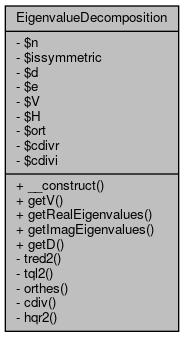 Collaboration diagram for EigenvalueDecomposition:
Collaboration diagram for EigenvalueDecomposition:Public Member Functions | |
| __construct ($Arg) | |
| Constructor: Check for symmetry, then construct the eigenvalue decomposition. More... | |
| getV () | |
| Return the eigenvector matrix. More... | |
| getRealEigenvalues () | |
| Return the real parts of the eigenvalues. More... | |
| getImagEigenvalues () | |
| Return the imaginary parts of the eigenvalues. More... | |
| getD () | |
| Return the block diagonal eigenvalue matrix. More... | |
Private Member Functions | |
| tred2 () | |
| Symmetric Householder reduction to tridiagonal form. More... | |
| tql2 () | |
| Symmetric tridiagonal QL algorithm. More... | |
| orthes () | |
| Nonsymmetric reduction to Hessenberg form. More... | |
| cdiv ($xr, $xi, $yr, $yi) | |
| Performs complex division. More... | |
| hqr2 () | |
| Nonsymmetric reduction from Hessenberg to real Schur form. More... | |
Private Attributes | |
| $n | |
| $issymmetric | |
| $d = array() | |
| $e = array() | |
| $V = array() | |
| $H = array() | |
| $ort | |
| $cdivr | |
| $cdivi | |
Detailed Description
Definition at line 24 of file EigenvalueDecomposition.php.
Constructor & Destructor Documentation
◆ __construct()
| EigenvalueDecomposition::__construct | ( | $Arg | ) |
Constructor: Check for symmetry, then construct the eigenvalue decomposition.
@access public
- Parameters
-
A Square matrix
- Returns
- Structure to access D and V.
Definition at line 782 of file EigenvalueDecomposition.php.
References $issymmetric, $n, hqr2(), orthes(), tql2(), and tred2().
 Here is the call graph for this function:
Here is the call graph for this function:Member Function Documentation
◆ cdiv()
|
private |
Performs complex division.
@access private
Definition at line 373 of file EigenvalueDecomposition.php.
Referenced by hqr2().
 Here is the caller graph for this function:
Here is the caller graph for this function:◆ getD()
| EigenvalueDecomposition::getD | ( | ) |
Return the block diagonal eigenvalue matrix.
@access public
- Returns
- D
Definition at line 849 of file EigenvalueDecomposition.php.
 Here is the call graph for this function:
Here is the call graph for this function:◆ getImagEigenvalues()
| EigenvalueDecomposition::getImagEigenvalues | ( | ) |
Return the imaginary parts of the eigenvalues.
@access public
- Returns
- imag(diag(D))
Definition at line 838 of file EigenvalueDecomposition.php.
References $e.
◆ getRealEigenvalues()
| EigenvalueDecomposition::getRealEigenvalues | ( | ) |
Return the real parts of the eigenvalues.
@access public
- Returns
- real(diag(D))
Definition at line 827 of file EigenvalueDecomposition.php.
References $d.
◆ getV()
| EigenvalueDecomposition::getV | ( | ) |
Return the eigenvector matrix.
@access public
- Returns
- V
Definition at line 816 of file EigenvalueDecomposition.php.
◆ hqr2()
|
private |
Nonsymmetric reduction from Hessenberg to real Schur form.
Code is derived from the Algol procedure hqr2, by Martin and Wilkinson, Handbook for Auto. Comp., Vol.ii-Linear Algebra, and the corresponding Fortran subroutine in EISPACK.
@access private
Definition at line 398 of file EigenvalueDecomposition.php.
References $cdivi, $cdivr, $l, $n, $r, $t, $w, $x, $y, cdiv(), and e().
Referenced by __construct().
 Here is the call graph for this function:
Here is the call graph for this function: Here is the caller graph for this function:
Here is the caller graph for this function:◆ orthes()
|
private |
Nonsymmetric reduction to Hessenberg form.
This is derived from the Algol procedures orthes and ortran, by Martin and Wilkinson, Handbook for Auto. Comp., Vol.ii-Linear Algebra, and the corresponding Fortran subroutines in EISPACK.
@access private
Definition at line 291 of file EigenvalueDecomposition.php.
Referenced by __construct().
 Here is the caller graph for this function:
Here is the caller graph for this function:◆ tql2()
|
private |
Symmetric tridiagonal QL algorithm.
This is derived from the Algol procedures tql2, by Bowdler, Martin, Reinsch, and Wilkinson, Handbook for Auto. Comp., Vol.ii-Linear Algebra, and the corresponding Fortran subroutine in EISPACK.
@access private
Definition at line 185 of file EigenvalueDecomposition.php.
References $h, $l, $n, $r, e(), and hypo().
Referenced by __construct().
 Here is the call graph for this function:
Here is the call graph for this function: Here is the caller graph for this function:
Here is the caller graph for this function:◆ tred2()
|
private |
Symmetric Householder reduction to tridiagonal form.
@access private
Definition at line 76 of file EigenvalueDecomposition.php.
Referenced by __construct().
 Here is the call graph for this function:
Here is the call graph for this function: Here is the caller graph for this function:
Here is the caller graph for this function:Field Documentation
◆ $cdivi
|
private |
Definition at line 68 of file EigenvalueDecomposition.php.
Referenced by hqr2().
◆ $cdivr
|
private |
Definition at line 67 of file EigenvalueDecomposition.php.
Referenced by hqr2().
◆ $d
|
private |
Definition at line 42 of file EigenvalueDecomposition.php.
Referenced by cdiv(), and getRealEigenvalues().
◆ $e
|
private |
Definition at line 43 of file EigenvalueDecomposition.php.
Referenced by getImagEigenvalues().
◆ $H
|
private |
Definition at line 55 of file EigenvalueDecomposition.php.
◆ $issymmetric
|
private |
Definition at line 36 of file EigenvalueDecomposition.php.
Referenced by __construct().
◆ $n
|
private |
Definition at line 30 of file EigenvalueDecomposition.php.
Referenced by __construct(), getD(), hqr2(), orthes(), and tql2().
◆ $ort
|
private |
Definition at line 61 of file EigenvalueDecomposition.php.
◆ $V
|
private |
Definition at line 49 of file EigenvalueDecomposition.php.
The documentation for this class was generated from the following file:
- libs/composer/vendor/phpoffice/phpexcel/Classes/PHPExcel/Shared/JAMA/EigenvalueDecomposition.php











